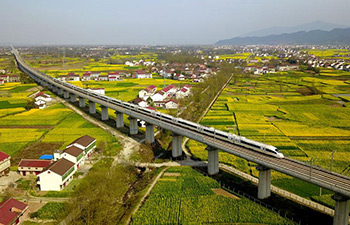by Levi J Parsons
CHRISTCHURCH, New Zealand, March 22 (Xinhua) -- In the aftermath of last Friday's mosque massacre in Christchurch that claimed the lives of at least 50 people in a racially motivated attack, counter-terrorism experts in Australia and New Zealand are continuing to examine why the gunman managed to slip through the cracks of police and intelligence agencies.
On both sides of the Tasman Sea, the alleged Australian-born terrorist Brenton Tarrant went undetected despite leaving a disturbing social media footprint and amassing an arsenal of military-style firearms.
WHY WAS CHRISTCHURCH GUNMAN NOT ON RADAR OF POLICE
"Authorities have an array of facilities available to pay careful attention to somebody once they're aware of them," Professor Greg Barton, an expert in countering violent extremism from Australia's Deakin University, told Xinhua recently.
"So it's a bit like a telescope, they're useless unless you know where to point them."
"Part of the problem is that there are a lot of people who post in general social media like Facebook or in more specialized online forums like 4Chan, who will post violent memes that contain hateful language, but it's often ironic and it can be difficult to tell if they're being serious."
"So there was nothing about him that made him stand out," he added.
In relation to the 28-year-old's stockpile of weapons and ammunition, with no national gun registry and free access for licence holders to military style semi-automatic weapons, there was no way for New Zealand Police to uncover the plot.
But in the wake of the horrific attack, New Zealand Prime Minister Jacinda Ardern announced a ban on all semi-automatic assault rifles and it's suspected that the New Zealand government will later move to make further reforms including a national firearms registry.
TOO EARLY TO TELL IF IT'S AN INTELLIGENCE FAILURE
Although both Australia and New Zealand have said that they've been paying attention to right-wing extremism for quite some time, after the tragic events of Christchurch, policing authorities have also acknowledged there are things that could be done better.
While Barton said it's too early to know if there's been any failure of intelligence, he believes "we obviously need to take right-wing extremism more seriously than we have."
"The New Zealand police have been very good in the way they've dealt with this."
"They came out and said we don't know if we have made a mistake and missed something, but we are going to have a look to figure out what we could have done better or whether a change of systems might in future make a difference."
NATIONAL HATE CRIME DATABASE COULD HELP AUTHORITIES
One of the measures Barton has called for in order to track extremist behaviours is a national database for hate crimes.
"Something that has come to light in New Zealand is that Muslims, not just in Christchurch but elsewhere, have been saying for some time they've been experiencing hateful incidents and things that may even constitute hate crimes," he said.
"But the problem in New Zealand as well as Australia is that there's no way to collect these reports, catalogue them in a standard way, share them with all agencies, spot patterns and act on them."
"So I think one of the needs in Australia and New Zealand is a national hate crimes register."
While attacks such as Christchurch are an obvious marker for investigators studying extremism, Barton said other incidents that may not be serious enough to warrant investigations or prosecutions can still be very useful to intelligence officers, as it can help highlight specific problems in geographical areas and lead authorities to "individuals of concern".
"WE HAVE TO CONFRONT EXTREMISM WITH HUMANITY"
As authorities grapple with immediate solutions to thwart any other potential mass-shootings, one of New Zealand's leading counter-terrorism experts has told Xinhua that in the longer-term society needs to confront extremism with "humanity".
"There isn't anything different about the kind of individual that might be vulnerable to any kind of extremism," Dr John Battersby from Massey University's Centre for Defence and Security Studies explained.
"Whether it's right wing extremism or people who get caught up in ISIS-inspired propaganda -- they don't quite fit in, they have a series of issues with social isolation, not much job prospects and they can start to withdraw online."
"The problem with that is they only interact with people that have their own views, there's no critical analysis or challenging of their views, so you start to get an echo chamber going."
Now with 24-hour access to like-minded groups around the world who share their dangerous ideals, Battersby explained that disturbed individuals often use this space as a retreat.
"For us, when there are views that are really extreme that we don't like, sometimes the reaction is, because it repulses us, push them out," he said.
"We stop listening to them, we stop challenging them and they withdraw further back into the echo chamber, but we have to break into these closed worlds, we have to expose the humanity of everybody else."
ONLINE CULTURE, REAL WORLD CONSEQUENCES
In the case of Tarrant, the influence of online culture was confrontingly apparent.
The alleged killer not only posted a 74-page manifesto to the web just moments before the attack, but also live-streamed the horrific mass-shooting via a number of popular social media platforms.
While web giants like Facebook, YouTube, Reddit and Twitter all acted quickly to take down the disturbing content, the 17-minute killing-spree was still widely viewed by millions of users for some hours after the attack.
With these platforms facing heavy criticism for not having the technical capability to act faster, Battersby said "part of it is just the world we live in now."
"At some point he has made the decision that he's going to do something, and therefore he needed to rationalize what that is."
"He sent his manifesto out 15 minutes before the attack... then he has given himself up and now he is treating this moment as a kind of stage -- similar to Anders Breivik (the Norwegian killer who took the lives of 77 people in the 2011 Oslo attacks).
New Zealand authorities have even gone as far to charge an 18-year-old with sharing the killer's live-stream and it's expected that many others could face similar charges.
If found guilty, the accused could face a maximum of 14 years' imprisonment.
"Investigators will be trying to examine the 200 people or so that watched the live-stream when it went up," Barton said.
"They will be looking at who they are? How they're linked to him? Why were they watching that livestream go out? Who of these people had he met face-to-face and what are their networks on the ground?"
INTELLIGENCE LOOKS AT ALLEGED KILLER'S TIME IN EASTERN EUROPE
While the pitfalls of online life pose significant risk to vulnerable individuals, there remains the possibility that the alleged killer's physical interactions may have also influenced his extreme ideology.
Tarrant's widely reported travels around Eastern Europe, where sophisticated networks of neo-nazi gangs are known to operate, may hold some answers for investigators.
"They [intelligence agencies] will definitely be looking at his time there," Battersby said.
"But I find it curious that he has also been to some many other places including Islamic countries like Pakistan and Turkey."
"Usually seeing other cultures up close would not radicalize a person."













